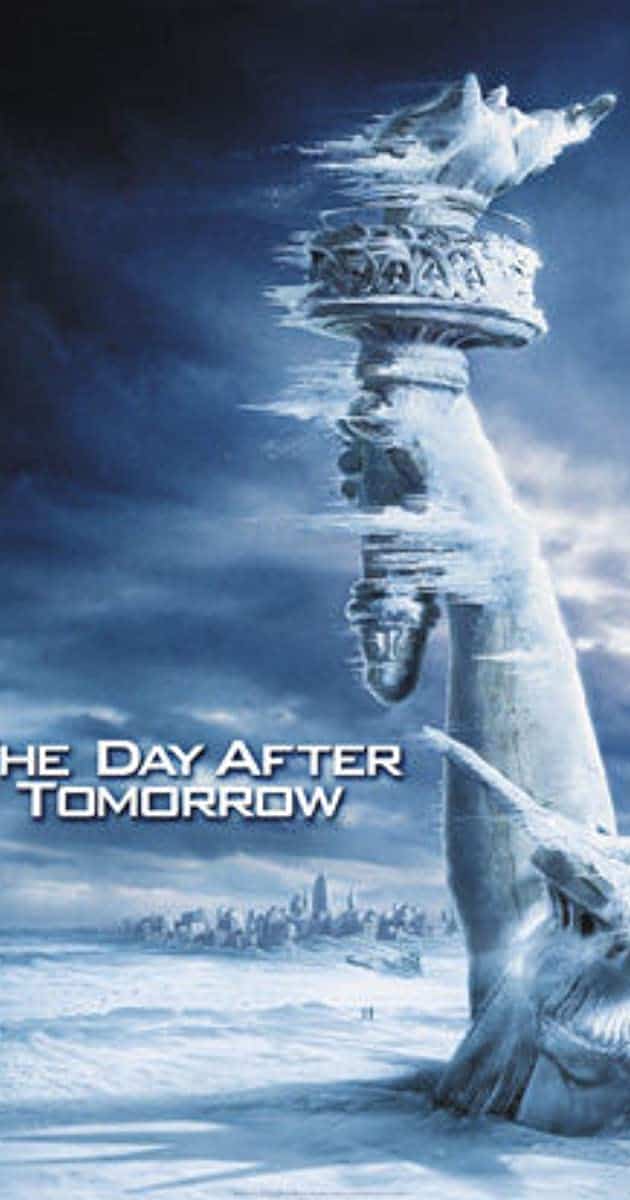Every scientist agrees that if we keep burning up fuel carelessly, eventually global warming will get so bad that it’s gonna be buh-bye, mankind. Usually, the image we have of that is boiling oceans and scorching heat that cook people alive, but the apocalyptic scenario in “The Day After Tomorrow” is the exact opposite. Inspired by “The Coming Global Superstorm”, a non-fiction novel by Art Bell and Whitley Strieber, director Roland Emmerich thought up a series of circumstances, starting with polar ice caps breaking apart and disturbing the fragile balance of the Northern Atlantic ocean currents, that leads to weeks of spectacularly bad meteorological conditions followed by a new Ice Age.
Emmerich admits that “while the events portrayed in the film are indeed possible, the timeframe over which they take place is implausibly short and was tailored for sheer entertainment value.” And on that level, it works. “The Day After Tomorrow” is preposterous, old fashioned, high-cheese B-moviemaking, but you can’t say it ain’t entertaining.
Dennis Quaid stars as a paleoclimatologist who sees the Super Storms coming but is ignored by his government bosses, including the Dick Cheney-like Vice President. When nature goes berserk, Quaid suddenly has everyone’s ears, but he has more pressing and personal concerns. His 17 year old son (played by Jake Gyllenhaal, who is and looks 23) is caught in New York, which has been flooded by tidal waves, snowed in and basically frozen solid in a matter of days, and the Father Who Was Never There Because Of His Job now wants to brave the elements to get to his son before it’s too late. “I will come for you, do you understand? I will come for you.”
Half the world’s population has been annihilated already, but what we really care about is whether Daddy will be able to keep his promise to his boy. That’s a bit silly, but storytelling-wise and emotionally, it works. The intimate is always more compelling than the global, because it’s easier to relate to. This isn’t great character drama or anything, but it’s enough to give a human touch to what might have been just an orgy of special effects.
The sequences of massive destruction are scary intense, but what really did it for me is the aftermath. There’s something truly sobering about seeing a city like New York emptied, its streets covered in snow, with its tall building looming over like desolate ice structures. The movie also offers a bunch of cheap thrills, none as ridiculous yet enjoyable as the scene where Gyllenhaal is attacked by wolves (?) while looking for antibiotics in a Russian ship (???) beached in the middle of Manhattan! And you know that action movie cliché where our heroes run away from a spreading fire/explosion? Here they do it with freezing air – our heroes have to outrun dropping temperature, if that makes any sense to you.
“The Day After Tomorrow” is a fun dumb ride, but that’s not enough for Emmerich. He ends his movie by restating that we shouldn’t take our planet for granted, that we can’t go on consuming all of its natural resources, etc. It’s certainly a worthy message, but like Steven Seagal giving a speech about the environment after blowing up half of Alaska in “On Deadly Ground”, it’s odd to hear it after millions of people have died for our enjoyment.

